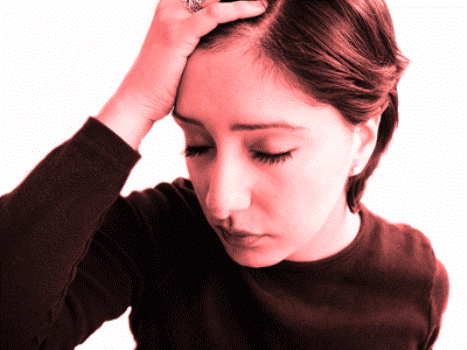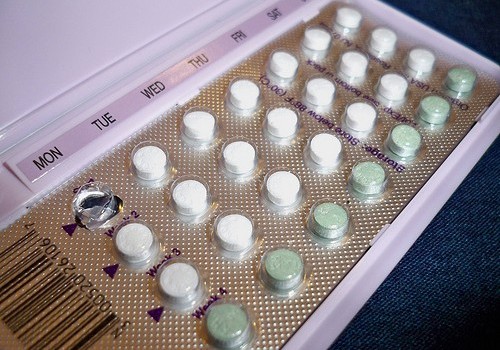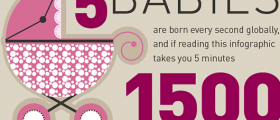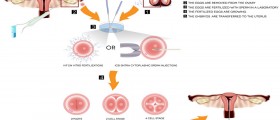
Exercise Regularly And Eat Well To Boost Your Fertility
Eating well, exercising regularly, and maintaining a healthy weight is not going to make any woman younger, or fix medical problems that lead to infertility. Women who don't have conditions that cause infertility and who are in their twenties and thirties will, however, improve their fertility if they live responsibly. Nutritional deficiencies and overweight or obesity have a negative impact on your chances of getting pregnant, and being in top form and eating a balanced diet will help you avoid these potential obstacles. A preconception checkup with your doctor can determine if you are deficient in any minerals and vitamins, and whether you are at an appropriate Body Mass Index.

Stress Doesn't Cause Infertility
"Relax, and you will get pregnant," is an offensive comment that is nonetheless frequently directed toward couples who suffer from infertility. There is evidence that stress can interfere with ovulation in the short term. If you are particularly stressed one month, your ovulation may be delayed or prevented. Stress is unpleasant and bad for your overall health, and you have plenty of good reasons to attempt to be as stress-free as possible. You don't need to add to your current stresses by worrying that your stress may cause long-term infertility, though.
- Important notification about information and brand names used in this slideshow!
- Photo courtesy of lengtarang by Photobucket : media.photobucket.com/user/lengtarang/media/stress.jpg.html?filters[term]=stress&filters[primary]=images&filters[secondary]=videos&sort=1&o=23
- shine.yahoo.com/healthy-living/8-real-fertility-facts-you-need-to-know-2527261.html

Abortion, Miscarriage, And Your Chances Of Getting Pregnant
You may have heard that past pregnancy losses can interfere with your fertility. In most cases, this is simply not true. At least one in five pregnancies ends in miscarriage, and the majority of women who experienced one can get pregnant again and carry a pregnancy to term. Research shows that it is perfectly safe to start trying to conceive a single menstrual cycle after miscarriage. You have plenty of reasons to be optimistic. A past abortion shouldn't affect your fertility either, unless you had complications, like cervical damage, from the procedure.
- Important notification about information and brand names used in this slideshow!
- Photo courtesy of funnyshare by Photobucket : media.photobucket.com/user/funnyshare/media/stress.gif.html?filters[term]=stress&filters[primary]=images&filters[secondary]=videos&sort=1&o=14
- shine.yahoo.com/healthy-living/8-real-fertility-facts-you-need-to-know-2527261.html

Overall Good Health Doesn't Mean You Are Fertile
You eat a really healthy diet, exercise five times a week, and don't smoke or drink. You must be fertile, right? Living a healthy lifestyle will do your body a lot of good, and it will also maximize your fertility. It does not, unfortunately, prevent you from having a fertility problem like blocked fallopian tubes, endometriosis, or a hormonal imbalance. You may even have unexplained infertility. One in 10 couples meets with fertility struggles, and being generally healthy does not grant you immunity. Age is one common cause of infertility you don't have any control over, beyond being aware of this simple fact: you will never be as fertile as you are now.

Men Have Biological Clocks Too
Did you think that men don't have a biological clock, and that their ability to impregnate their partner is guaranteed into old age? Some men do become fathers in their sixties and seventies, but don't rely on this. Studies show that only eight percent of men under 25 have trouble getting their partner pregnant, but that this rises to 15 percent after age 35. There is another factor too: as a man gets older, so will his partner. Your odds of getting pregnant will never be as good as they are right now, and age is the biggest cause of infertility.

Contraceptives And Your Return To Fertility
Women who would like to get pregnant in the not-too-distant future, but not quite yet, should consider the implications of their chosen birth control method very seriously. Depo Provera, the contraceptive injection, is infamous for keeping ovulation away for much longer than it should. Methods that are designed to be in place for multiple years, like the Mirena or Paragard intrauterine devices, may not be good choices for you either. A birth control pill is a quickly reversible contraceptive, and condoms may be a good choice for couples who would like to get pregnant quite soon as well. A wide variety of contraceptives is on the market today; talk to your family doctor if you are not sure what is available.

Your Fertile Window Is Much Shorter Than You May Think
Getting pregnant isn't as simple as it seems! You may have many fewer fertile days than you expected. An unfertilized egg will not be viable for longer than 12 to 24 hours after ovulation, and only five to seven days before ovulation are "fertile days". You can increase your chances of conceiving by monitoring your fertile window. Fertility charting, ovulation predictor kits, and ovulation calendars are all at your disposal. You have fewer fertile days than you may have expected, so make the most of them by knowing when they occur.
- Important notification about information and brand names used in this slideshow!
- Photo courtesy of AmsterdamPrinting by http://www.flickr.com/photos/amsterdamprinting/4366328312/
- www.rexhealth.com/body.cfm?id=1849

Sexual Positions And Fertility
Many couples are under the impression that the sexual positions they try out have an impact on their fertility. It seems logical that sperm have a better chance of getting to the egg if a couple does the deed in the missionary position instead of, say, in the woman-on-top position. A healthy man's ejaculate contains millions of sperm, and though some will inevitably come out after intercourse, there is no evidence that you have a higher chance of conceiving if you "follow the laws of gravity". Do remember that being bored in bed may lead to a lower chance of having intercourse in the first place.

You Can't Have Too Much Sex
Millions of sperm are produced in a man's testicles every day, and there is some evidence that "old sperm" can interfere with the fresh lot's ability to reach an egg. If you have heard that having sex every day can harm your chances of getting pregnant, you can forget about that now — current research suggests otherwise. Couples who have intercourse every day were found to have slightly better odds of conceiving during any one cycle. If you want to go along with that, great. Don't let statistics pressure you into having sex when you don't want to, though. Women who are happy and relaxed are also more likely to ovulate regularly.
- Important notification about information and brand names used in this slideshow!
- Photo courtesy of JakeLegend by Photobucket : media.photobucket.com/user/JakeLegend_2008/media/Comments%20images/Kissing%20lovers/CoupleInBed04_zps3ea92504.jpg.html?filters[term]=couple%20in%20bed&filters[primary]=images&filters[secondary]=videos&s
- www.kidspot.com.au/Pregnancy-Conception-7-surprising-fertility-facts+3632+121+article.htm

Regular Menstrual Cycles Don't Mean You Are Fertile
Do you think that menstruating regularly means that you can get pregnant easily? Regular menstrual cycles are definitely a good sign that may indicate that you ovulate regularly too. It is still good to know that many other factors can get in the way of achieving pregnancy, however. A responsible approach to diet, exercise, and lifestyle will maximize your fertility. Couples who have been trying to conceive for longer than a year and have done everything in their power to make it happen should get checked for possible fertility problems.


























Your thoughts on this
Loading...